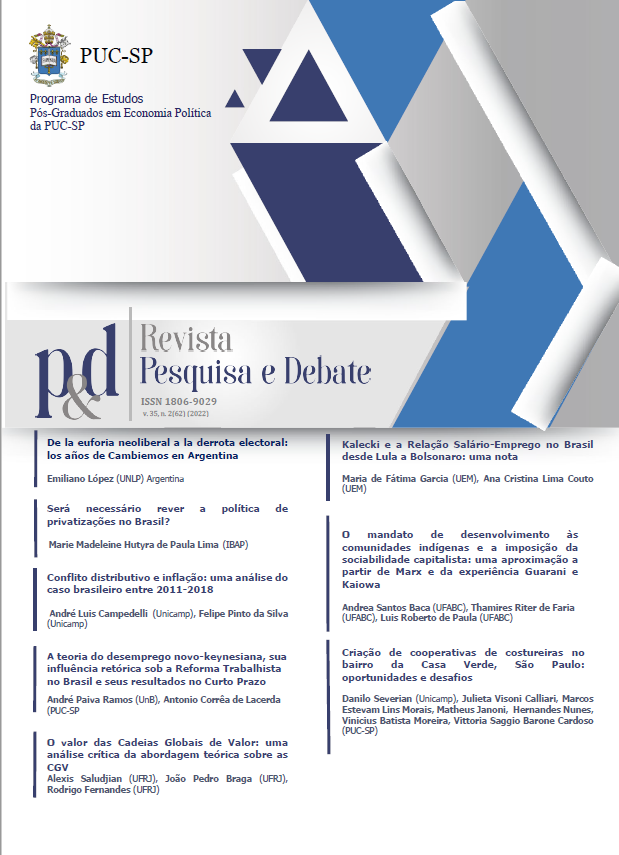The New Keynesian unemployment theory:
its rhetorical influence under the Labor Reform in Brazil and its results in the Short Term
DOI:
https://doi.org/10.23925/1806-9029.v35i2e60391Keywords:
Neokeynesianism, Employment policy, Macroeconomics, Labor Reform, Wage RigidityAbstract
Abstract: The article will discuss the influence of the neo-Keynesian school of thought on the 2017 Labor Reform and the positioning of the last Brazilian governments in economic management. Theoretical assumptions will be presented, the intrinsic limitations to the thought of this school, in the light of neo-Keynesian thought; finally, the practical results of the reforms and macroeconomic policies will be presented, relating them to the criticisms presented throughout the work, developing the hypothesis that the neo-Keynesian theoretical assumptions are not adequate for the Brazilian economy in its underdeveloped dynamics.
Key-Words: Neokeynesianism; Employment policy; Macroeconomics; Labor Reform; Wage ridigity
References
BLANCHARD, Olivier; SUMMERS, Lawrence. Hysteresis and the European unemployment problem. Working Paper NBER, n. 1950, Jun. 1986.
DARI, José Dari, GIMENEZ, Denis Maracci e SANTOS, Anselmo Luis. Dimensões críticas da reforma trabalhista no Brasil. Campinas: Ed. Curt Nimuendajú, 2018
DEOS, Simone; Novoclássicos e novokeynesianos: algumas considerações sobre as semelhanças e diferenças nos fundamentos microeconômicos e no tratamento da dicotomia entre fenômenos monetários e reais. Leituras de Economia Política, Campinas (7), 151-158, jun/dez. 1999
FERRARI FILHO, Fernando. “Keynesianos”, monetaristas, novo-clássicos e novo-keynesianos: uma crítica pós-keynesiana, Ensaios FEE (17) 78-101, Porto Alegra, 1996.
KEYNES, John Maynard. A teoria geral do emprego, do juro e da moeda. São Paulo: Nova Cultural, 1996 [1936]. (Os Economistas)
MEIRELLES, Henrique. Entrevista ao jornalista Alexandre Martello, “Nova Lei trabalhista deve gerar 6 milhões de empregos, diz Meirelles, disponível em: https://g1.globo.com/economia/noticia/nova-lei-trabalhista-vai-gerar-mais-de-6-milhoes-de-empregos-diz-meirelles.ghtml. Acesso em: 15/12/2022
PATINKIN, D. (1965). IMoney, interest, and prices. New York: Harper & Row.
PRONI, M. W. Teorias do desemprego: debates contemporâneos. Revista Pesquisa & Debate, PUC-SP, São Paulo, v. 27, n. 1 (49), p. 63-90, jan./mar. 2016
SERRA, Gustavo Pereira; BOTTEGA, Ana; SABCHES, Marina da Silva. A reforma trabalhista de 2017 teve efeito sobre a taxa de desemprego no Brasil? Uma análise dos primeiros anos de vigência da Lei 13.467/2017. MADE – Centro de pesquisa em macroeconomia das desigualdades. Nota de Política Econômica, nº21. Maio, 2022.
SHAPIRO, Carl, and Joseph E. STIGLITZ. “Equilibrium Unemployment as a Worker Discipline Device.” The American Economic Review 74, no. 3 (1984): 433–44. http://www.jstor.org/stable/1804018.
SICSÚ, João. Keynes e os novos-keynesianos. Revista de Economia Política, v. 19, n. 2, p. 84-102, abr./jun. 1999.
WEBSTER, David. Long-term unemployment, the invention of “hysteresis” and the misdiagnosis of structural unemployment in the UK. Cambridge Journal of Economics, v. 29, issue 6, p. 975-995, Nov. 2005.
WELLE, Arthur; ARANTES, Flávio; MELLO, Guilherme; ROSSI, Pedro. Os impactos da pejotização e da formalização no financiamento da previdência social: uma simulação pautada pela reforma trabalhista. Juslaboris, Ano VIII. N. 80. Junho 2019.
Downloads
Published
How to Cite
Issue
Section
License
Copyright (c) 2023 Pesquisa & Debate Revista do Programa de Estudos Pós-Graduados em Economia Política

This work is licensed under a Creative Commons Attribution 4.0 International License.


